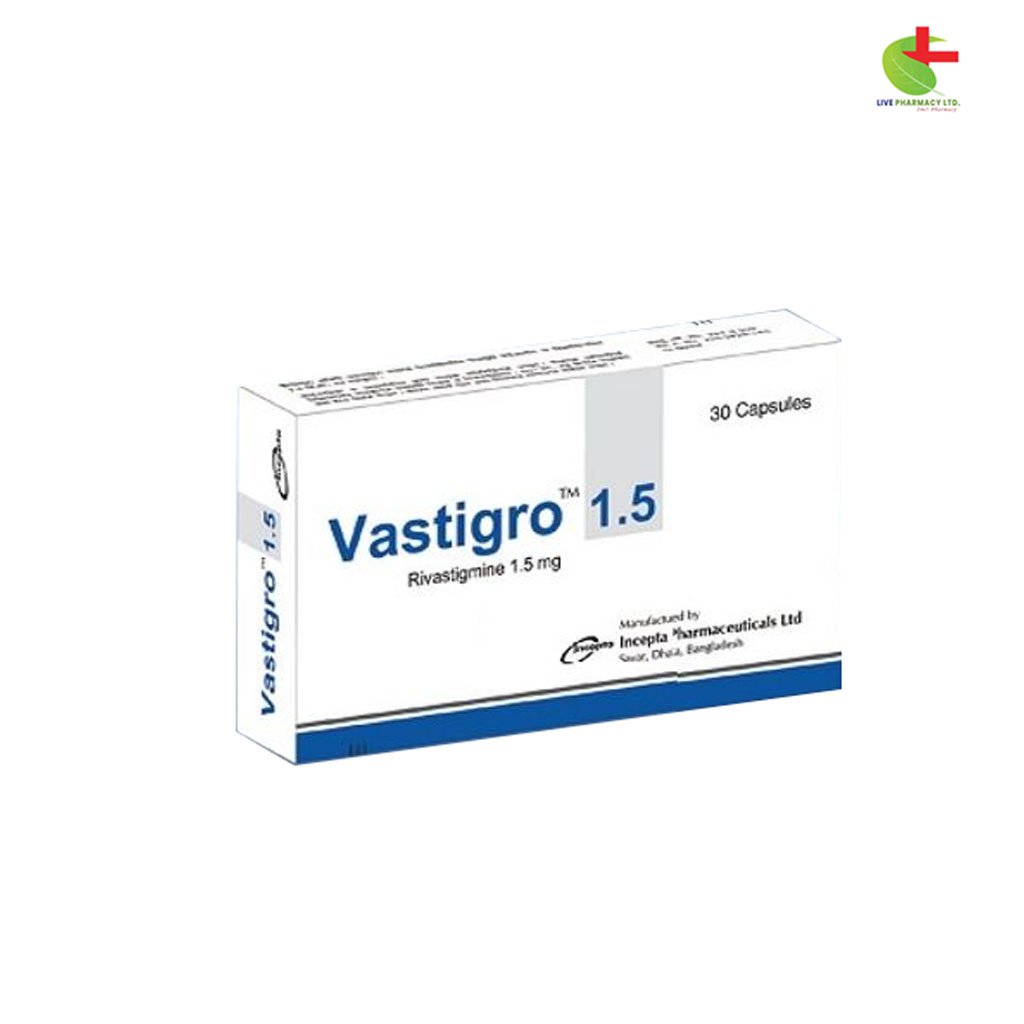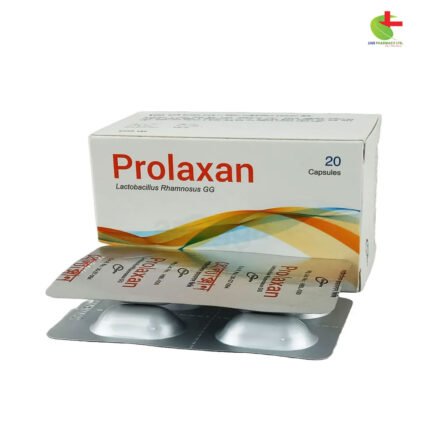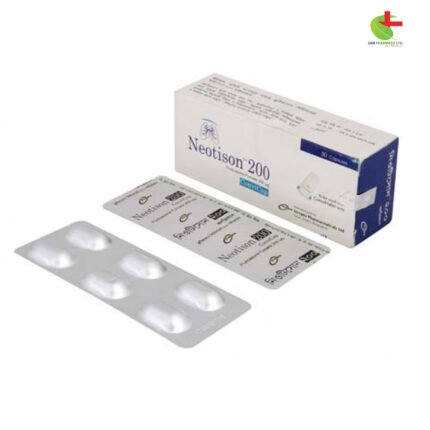Vastigro 1.5
200.00৳ Strip(10)
- Rivastigmine is used for the symptomatic treatment of mild to moderate Alzheimer’s disease and dementia related to Parkinson’s disease.
- It works by inhibiting cholinesterase enzymes, increasing acetylcholine levels in the brain.
- Available in both capsule and transdermal patch forms, with dose adjustments based on individual tolerance.
- Always follow the guidance of a registered healthcare professional for proper use and dosage.
 Brand
Brand
|
Incepta Pharmaceuticals Ltd |
|---|---|
 Generics
Generics
|
Rivastigmine Tartrate |
 Type
Type
|
Capsule |
0
People watching this product now!
Description
Indications
- Rivastigmine is used for the symptomatic treatment of mild to moderate Alzheimer’s disease and dementia associated with Parkinson’s disease.
- Note: Use only as prescribed by a registered healthcare professional.
Pharmacological Action
Rivastigmine, a carbamate derivative, shares structural similarities with physostigmine but is distinct from donepezil and tacrine. Its exact mechanism of action remains under investigation, but it is believed to work by reversibly binding to cholinesterase enzymes (acetylcholinesterase and butyrylcholinesterase). This inhibition prevents the breakdown of acetylcholine, increasing its concentration at nerve synapses. Rivastigmine selectively inhibits brain cholinesterase enzymes more than those in peripheral tissues.
Dosage Instructions
Rivastigmine Capsules
- Initial Dose: 1.5 mg twice daily.
- Dose Titration: After two weeks, if well tolerated, the dose can be increased to 3 mg twice daily. Further increases can be made to 4.5 mg and then 6 mg twice daily, with a minimum of two weeks between adjustments.
- Maintenance Dose: 3 mg to 6 mg twice daily. The maximum recommended dose is 6 mg twice daily. Treatment should continue as long as the patient benefits from it.
- Re-initiation: If treatment is interrupted for several days, restart at 1.5 mg twice daily, then gradually increase as described.
Rivastigmine Transdermal Patch
- Initial Dose: Start with 4.6 mg/24 hours patch, applied to intact skin.
- Dose Adjustment: After 4 weeks, increase to 9.5 mg/24 hours if tolerated. After another 4 weeks, the dose can be raised to 13.3 mg/24 hours for maximum therapeutic effect.
- Alzheimer’s and Parkinson’s Disease Dementia: 9.5 mg/24 hours or 13.3 mg/24 hours once daily.
- Severe Alzheimer’s Disease: 13.3 mg/24 hours patch daily.
- Treatment Interruption: If the patch is not applied for more than 3 days, restart at 4.6 mg/24 hours and re-titrate.
Note: Always follow your doctor’s advice when using this medication.
Administration
- Rivastigmine should be taken twice a day, preferably with meals (morning and evening). Always follow your doctor’s instructions.
Drug Interactions
- As a cholinesterase inhibitor, Rivastigmine may enhance the effects of succinylcholine-type muscle relaxants during anesthesia. Caution is advised when selecting anesthetics.
- Rivastigmine should not be used with other cholinomimetic drugs, as it may interfere with anticholinergic medications.
- No significant pharmacokinetic interactions have been observed with digoxin, warfarin, diazepam, or fluoxetine. Rivastigmine does not affect the prothrombin time induced by warfarin or alter cardiac conduction when taken with digoxin.
Contraindications
- Do not use if allergic to rivastigmine or other carbamate derivatives.
Common Side Effects
- Gastrointestinal issues like nausea (38%) and vomiting (23%) are common, especially during dose adjustments. Women may experience more gastrointestinal side effects and weight loss compared to men.
Pregnancy & Lactation
- No clinical data is available for Rivastigmine during pregnancy. It should only be used if absolutely necessary. Rivastigmine passes into animal milk, and its excretion into human milk is unknown. Therefore, breastfeeding should be avoided while using Rivastigmine.
Precautions & Warnings
- Caution is needed for patients with heart rhythm disorders, respiratory issues, or urinary problems.
- Rivastigmine may increase gastric acid secretion and could worsen conditions like seizures, asthma, or pulmonary diseases.
- Monitor patients with liver or kidney issues, and those with weight loss.
Use in Special Populations
- Renal and Hepatic Impairment: Dose adjustments are required for those with moderate renal or mild to moderate liver issues. Follow individual tolerability closely when titrating doses.
- Pediatric Use: Rivastigmine is not recommended for use in children.
Overdose Management
- Most overdose cases are not associated with severe symptoms, and patients typically continue treatment. Symptoms can include nausea, vomiting, diarrhea, or even hallucinations. Bradycardia or syncope may occur due to its vagotonic effects.
- In cases of overdose, treatment includes supportive care, antiemetics for nausea and vomiting, and atropine for severe symptoms. The plasma half-life of Rivastigmine is approximately 1 hour, and acetylcholinesterase inhibition lasts about 9 hours. For asymptomatic overdoses, avoid dosing for the next 24 hours.
Therapeutic Class
- Drugs used in the treatment of dementia.
Storage Conditions
- Store in a cool, dry place away from direct light.
Reviews (0)
Be the first to review “Vastigro 1.5” Cancel reply
About brand
Shipping & Delivery













Reviews
There are no reviews yet.